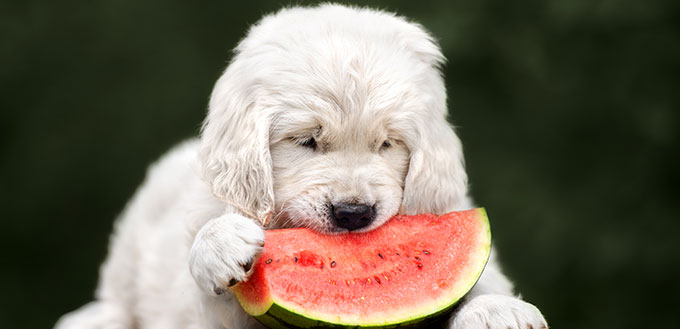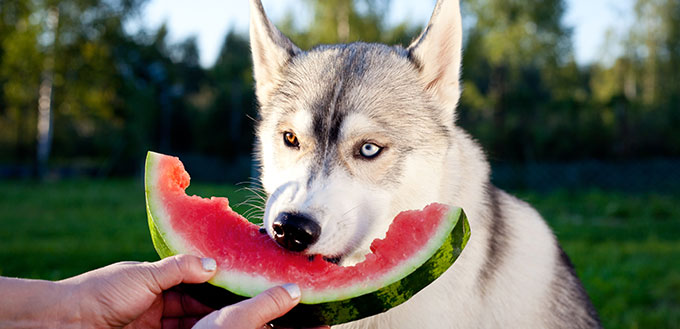Your dog’s diet doesn’t need to be a boring combination of kibble and wet dog food with the occasional handful of dog treats thrown in. Dogs appreciate variety as much as humans do, and feeding your pup watermelon is a great way to offer them fresh fruit which can have plenty of health benefits for your pup.
Why Feed Your Dog Watermelon?
According to the American Kennel Club, watermelon has plenty of benefits for your pup, as long as you take the correct precautions and remove all of the seeds and rind first. A word of warning: Even seedless watermelon can still hold hollow seeds, you’ll need to be sure to remove these kinds of seeds, as well.
Watermelon is a low-calorie tasty treat. One cup full of it only has around 50 calories. The watermelon jerky recipe that we shared is around 5 calories a slice, making it an excellent alternative to regular jerky if you don’t mind taking the time to make it. If you are looking for more options, check out our guide on jerky treats for dogs.
Breakdown of 1 Cup Watermelon
- Calories: Approx. 40 to 50 kcals
- Water content: 92%
- Vitamins: A, B6, C
- Carbohydrate: 11.6 grams
- Sugar: 9.5 grams
- Fiber: 0.6 grams
- Protein: 0.9 grams
- Fat: 0.2 grams
Contains potassium, calcium, and magnesium.
Health Benefits of Watermelon
There are many health benefits that come with feeding watermelon to your dog. Watermelon in regulated amounts is good for dogs to eat, and can even help clean dog’s teeth in place of using dental sticks.
Alongside containing Vitamin C, watermelon is naturally low-sodium, practically fat-free, rich in antioxidants, and cholesterol-free. It also contains lycopene, which may lower high blood pressure.
The beneficial nutrients of the fruit can aid healthy digestion and even boost a dog’s immune system.
How to Feed Your Dog Watermelon
Now that you know the answer to “can dogs eat watermelon?”, we’re going to take you through some crucial basics about feeding your dogs watermelon. You should only feed your dogs one cup of watermelon at a time. This will help avoid giving any of your dogs an upset stomach or making your dogs sick. Too much watermelon can cause issues with a dog’s health for a few different reasons.
Why Feeding Your Dog Watermelon Can Be Bad
Watermelon can cause digestive issues in dogs and make your dog sick. The fiber content may not seem high for humans, but too much watermelon can give a dog diarrhea. This is the same with several other fruits, including cantaloupe.
This doesn’t mean that you can’t feed your dog watermelon, it just means you need to be sensible about how much you feed them. A larger dog is going to be able to eat more watermelon than a smaller dog before there are any adverse effects, but they should still be limited to a single cup full (around 150 grams or so).
You should only supplement your dog’s regular dog food with watermelon as a treat. Watermelon is not a suitable pet food alternative as it is, ultimately, a human food that they aren’t used to digesting. Thankfully, there isn’t much to watermelon that can harm your dog but there are parts of it that you should avoid when you let your dog eat watermelon.
Avoid Seeded Watermelon
You may be asking yourself is watermelon safe for your dog? The real answer doesn’t lie in the red parts of this juicy fruit, but in the seeds that are embedded into each piece. When buying watermelon for dogs, consider purchasing seedless watermelon. Watermelon with seeds in it can cause your dog to experience gastrointestinal upset or an upset tummy. But that’s only the tip of the iceberg.
Why Seeds Are So Harmful
One or two seeds are fine, they won’t harm your dog, but too many seeds can cause an intestinal blockage and your dog won’t be able to pass them without help. No one wants to take a long, worrisome, and costly trip to the vets to have watermelon seeds removed from their dog’s digestive tract.
In the event that your dog eats any seeds, be alert, and lookout for signs of blockages. Your dog will likely not be able to pass a stool, or if they try to, it will seem to be incredibly painful. The moment you see any signs of this, take your dog to an emergency vet or try to fit in an appointment with your regular vet.
Make Watermelon a Healthy Snack
Watermelon on a hot day can be a refreshing treat for both larger dogs and smaller dogs. Many dogs love eating watermelon and it can be an excellent addition to any dog’s diet.
Use ice cube trays to freeze seedless watermelon and you’ll always have it at the ready for the perfect summer treat. Dogs don’t tolerate high temperatures well, and they’ll certainly appreciate a cool treat if you have one to offer.
Frozen watermelon chunks are also fat-free and naturally sweetened, making them a sweet treat without any artificial sweeteners or unnecessary additions.
To make this treat, just de-seed some watermelon (or buy seedless), and dice it up into chunks. You can then either freeze these chunks into an ice cube tray for easy access or put them in a baggie or a container. Simple!
How to Make Watermelon Jerky
Another healthy treat for your pup, but one you will probably need to make yourself. You will need a dehydrator to make these treats, but they’re great for when your dogs eat during the summer months. They won’t cool them down as much as icy watermelon chunks, but all pups appreciate a good piece of jerky.
- Cut your watermelon into slices to make it easier to work with.
- Remove the seeds from the watermelon.
- Remove the rind from the watermelon.
- Cut the slices of watermelon into large rectangles (or a similar shape).
- Place in a dehydrator set to 135 degrees for 12 hours. Alternatively, place them on a baking tray in your oven at the same temperature for the same amount of time. If your oven’s lowest temperature is higher than 135 degrees, shorten the cooking time accordingly.
- Remove the finished jerky and store it in an airtight food container, which should then be kept in a cool, dry area.
How Much Watermelon Can Small Dogs Have?
Whether you have large dogs or small, the best rule to stick to for feeding them treats (including watermelon) is this:
Take your dog’s daily calorie intake and calculate 10% of it. That 10% is the absolute maximum that your dog should be eating in treats over the course of each day.
As for watermelon, itself, never feed any pup more than 1 cup per day or you’ll risk their health.
Note: The advice provided in this post is intended for informational purposes and does not constitute medical advice regarding pets. For an accurate diagnosis of your pet's condition, please make an appointment with your vet.









